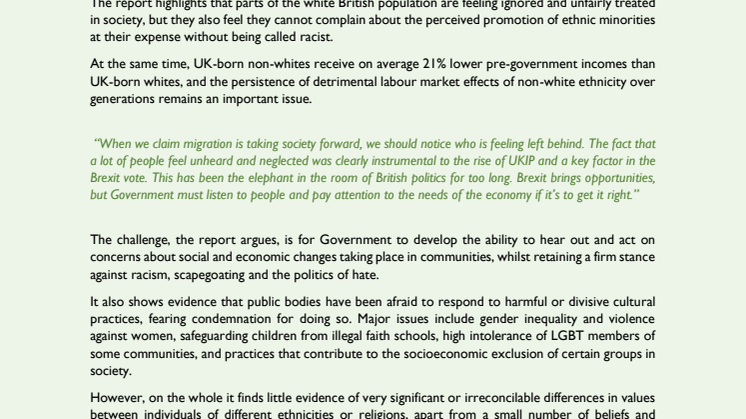Press release -
Government Failing the Nation on Immigration
Government is failing to see the facts when it comes to immigration and cultural change and is failing the public by dumbing down the issue, says a new report by Elephant Policy Centre, a think tank.
Its author, Christopher Crompton, explains:
“Immigration is not a simple and singular issue and should not be glossed over as such. Under the umbrella of immigration is a great web of complexity, and if Government oversimplifies the issue, it risks jeopardising the economy, harming the wellbeing of resident foreign nationals, and misunderstanding what the public actually wants. In a recent poll, just 15% of the public said the policies of political party they voted for completely reflected their views on immigration.”
Political Correctness Gone Mad?
The report highlights that parts of the white British population are feeling ignored and unfairly treated in society, but they also feel they cannot complain about the perceived promotion of ethnic minorities at their expense without being called racist.
At the same time, UK-born non-whites receive on average 21% lower pre-government incomes than UK-born whites, and the persistence of detrimental labour market effects of non-white ethnicity over generations remains an important issue.
“When we claim migration is taking society forward, we should notice who is feeling left behind. The fact that a lot of people feel unheard and neglected was clearly instrumental to the rise of UKIP and a key factor in the Brexit vote. This has been the elephant in the room of British politics for too long. Brexit brings opportunities, but Government must listen to people and pay attention to the needs of the economy if it’s to get it right.”
The challenge, the report argues, is for Government to develop the ability to hear out and act on concerns about social and economic changes taking place in communities, whilst retaining a firm stance against racism, scapegoating and the politics of hate.
It also shows evidence that public bodies have been afraid to respond to harmful or divisive cultural practices, fearing condemnation for doing so. Major issues include gender inequality and violence against women, safeguarding children from illegal faith schools, high intolerance of LGBT members of some communities, and practices that contribute to the socioeconomic exclusion of certain groups in society.
However, on the whole it finds little evidence of very significant or irreconcilable differences in values between individuals of different ethnicities or religions, apart from a small number of beliefs and practices of some immigrant groups, which are sometimes underpinned by cultural tradition and religious belief.
Economy and Skills
The report also finds that important social issues such as affordable housing, jobs and skills, and the NHS have much more to do with Government mismanagement than pressures caused by immigrants. Migrant labour remains essential to some sectors of the economy, it says, and will remain so unless the UK can adapt labour and skills to the needs of UK businesses and the public sector.
It recommends that Government undertake a national review into the labour requirements of UK businesses, taking particular note of roles for which there is a high reliance on non-UK labour, and using this information to better inform a comprehensive UK skills strategy to go hand-in-hand with a responsive and appropriate immigration policy.
Housing
Evidence suggest that impacts of migration on house prices are very small. There is a competitive effect in private rental markets in some areas, but the largest problem is in social housing lets. Although fewer than one in ten social housing lets are occupied by foreign nationals, there is a real danger that these occupancies will stir resentment among the UK-born who are struggling to find truly affordable rent, the report argues.
Foreign ownership of high-value properties in London in particular, especially as second homes or investment property, is problematic due to underuse of residences and speculative effects on prices.
NHS
The annual cost to the NHS associated with migration to the UK is very small compared to the cost of new technologies and improved standards of care and of rising costs and wages. Evidence does not support the notion that foreign-born UK residents as a whole are not paying for the health services they use. However, Government has failed properly charge for costs of NHS services to foreign nationals that it is entitled to reclaim.
Brexit could have a detrimental effect on NHS staffing. For example, in recent years, around 7,000 nurses a year have been recruited from Europe, but EU nationals who registered as nurses in England fell by 92% after the Brexit vote and there has been a rise in the number deciding to stop working in the UK.
Further comments from the report’s author, Christopher Crompton:
“While defences of high levels of immigration typically centre on economics, it is crucial to understand social impacts of cultural change, both for existing residents of the host country and for immigrants themselves.”
“I hope this report goes some way to setting the facts straight about both the benefits and issues associated with immigration, and to highlighting important nuances in terms of the many different types and contexts of migration flows, in terms of public support for differentiated policy, and in terms of the possible approaches to managing migration and cultural change.”
Topics
- Economy
Elephant Policy Centre is an independent, non-partisan organisation committed to the research, evaluation and promotion of policy that serves the progress of society and the natural environment upon which our continued prosperity depends.
Our research draws on sources including academia, public opinion, the media, governments and other think tanks. We seek multiple perspectives, with the aim of presenting a more complete picture of contemporary issues and ways in which they are understood. Elephant Focus Reports are intended to deliver the best in reliable, impartial, user-friendly policy research, and are published online, free of charge.
We are non-partisan and distance ourselves from the political spectrum. Instead, we have a broad set of fundamental principles for integrity and social progress that transcend political lines. We define social progress as movement towards a more peaceful, cohesive and prosperous society that promotes the wellbeing of all. You can find more about Elephant and its principles at elephantpolicy.org
Our approach is simple: we home in on the greatest challenges affecting society and the policy topics of most pressing concern to citizens. We then turn these concerns into Focus Questions that we can use as catalysts for open-minded exploration of possible pragmatic solutions. Reports are structured around four key questions:
1) What’s the issue?
2) How did we get here?
3) What has been tried?
4) What are the options for policy?
Executive Summary:
http://elephantpolicy.org/Executive%20Summary%20-%20Immigration.pdf
Full Report:
http://elephantpolicy.org/ImmigrationFocusReport.pdf
Contact:
c.crompton@elephantpolicy.org

